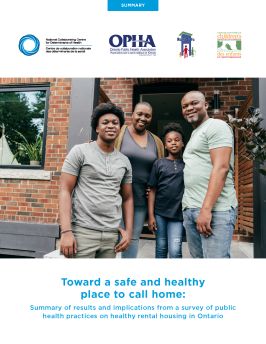Toward a safe and healthy place to call home: Summary of results and implications from a survey of public health practices on healthy rental housing in Ontario
Cette ressource est également disponible en français.
A healthy home provides the foundation for health and well-being
Housing is a basic need and a determinant of health and is recognized as a human right in Canada. However, despite the direct link between healthy housing and population health, specific roles for public health to address healthy conditions in rental housing remain unknown or often vague and can limit public health action.
To address this gap, RentSafe, an initiative of the Canadian Partnership for Children’s Health and Environment, and the Ontario Public Health Association conducted a survey of public health units in Ontario in the winter of 2023–2024. The purpose of the survey was to identify relevant public health practices and opportunities for action.
Unhealthy housing is a key driver of health inequity
Inadequate and unhealthy rental housing conditions include environmental contaminants, poor-quality conditions, pests, mould, water and sewage leaks, and deteriorating conditions. All of these factors negatively affect physical and mental health and well-being, and they are disproportionately experienced by renters who are Indigenous, racialized, and living with low income, pre-existing health conditions, and housing insecurity.
The multifaceted impact of housing conditions on health requires an intersectoral approach across health and non-health sectors. Public health is well positioned to address health inequities associated with unhealthy housing through all six core public health functions, and through its leadership and knowledge mobilization roles.
Public health roles and opportunities to promote healthy housing
A framework, based on the NCCDH’s well-established public health roles for improving health equity, outlines five areas for public health action on healthy housing. Results of the survey are presented alongside recommended actions for each of these roles, which are summarized below.
-
Engage grounded expertise: Integrate the knowledge, insights, perspectives, skills and leadership of people with lived and living experience of housing inadequacy across all strategies.
-
Partner with other sectors: Engage and work with health and non-health sectors to co-develop and implement strategies.
-
Assess and report: Share data and community-based knowledge on the existence and impact of unhealthy housing conditions.
-
Modify and orient interventions: Shift interventions to promote healthy housing conditions and reduce associated inequities.
-
Participate in policy development: Co-lead, support and participate with tenant groups and housing organizations in housing policy development, analysis and advocacy.
Suggestions for where to start and examples of promising practices are provided for each public health role. A glossary of relevant terms as well as a list of intersectoral partners for action on healthy housing are included as appendices.
Use this resource to:
-
Build a case for why and how improving rental housing conditions is a public health priority to advance health equity
-
Develop a plan for engaging grounded expertise in all public health housing-related strategies
-
Identify intersectoral partners in your area for relationship development and collaborative action on housing conditions
-
Share examples of real-time public health actions as a model to adapt for your own work
Related resources
Housing as a focus for public health action on equity: A curated list
Towards healthy homes for all: What the RentSafe findings mean for public health in Canada
Webinar: Housing, health equity and opportunities for public health
Island Health response teams mitigate impacts of COVID-19 in underhoused populations. Equity in Action.
Reference
RentSafe, National Collaborating Centre for Determinants of Health, & Ontario Public Health Association. (2025). Toward a safe and healthy place to call home: Summary of results and implications from a survey of public health practices on healthy rental housing in Ontario. Antigonish, NS: NCCDH, St. Francis Xavier University
Tags: Environmental health, Housing, Public Health Association, Document, Report / Document
